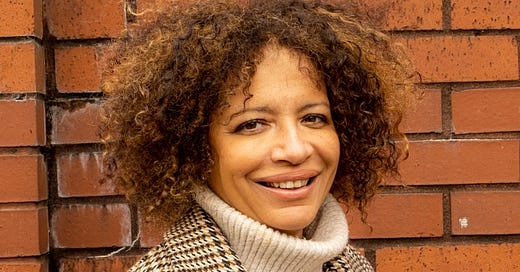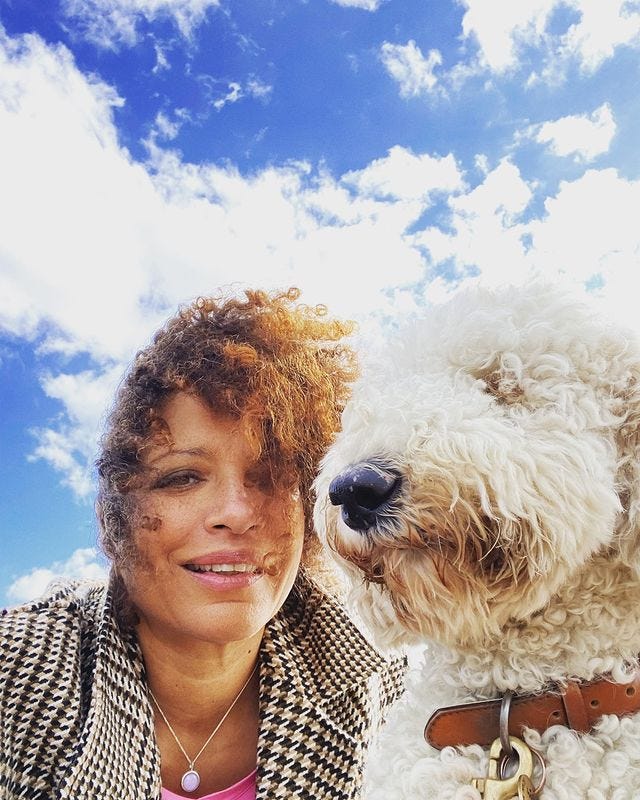Diana Anyakwo: “So many words exist for what I am”
The author on discrimination from both sides, seeing the bigger picture and a clash of cultures
Hi, welcome back to Mixed Messages! This week I’m speaking to author Diana Anyakwo, who is of mixed Irish and Nigerian heritage. Diana’s debut novel, My Life As A Chameleon, follows 16-year-old Lily, soon to travel from her hometown of Manchester to her birthplace, Nigeria. The tension underneath Lily’s dual reality threatens to bubble to the surface as she struggles with reconnecting with her family, feeling different at school and never quite knowing where she fits. With echoes of Diana’s own experiences as a mixed-race woman, I was keen to hear her story – read it below.
How do you define your racial identity?
It’s quite difficult, because so many words now exist for what I am. I usually say I’m half-Irish from my mum and half-Nigerian from my dad. Sometimes I don’t like the word mixed-race, maybe because I’m a bit older, it just reminds me of a tin of Heinz 57. I don’t know the correct way to describe myself.
It sounds a bit odd saying you’re half-this and half-that, like you’re not a full person. So I’m still struggling with that description. Anytime anybody asks me where I’m from, there’s always a moment of hesitation on how to answer.
In Nigeria, people still describe themselves as half-caste – it wasn’t until I came here that I realised that it has bad connotations and was almost an insult. That’s what I’d been calling myself, and in my mind, it wasn’t negative, it was just descriptive.
You grew up in Nigeria until you were a teenager – did that give you a more solid grounding in your identity?
It definitely did. You’re growing up around people that more or less look like you and have the same culture. There is colourism in the Caribbean and in Africa, so you’re treated a bit differently. You’re treated as if you’re special if you’re ‘half-caste,’ but here was completely different.
I moved to Manchester in the ‘90s, and although it was diverse it was segregated. Most people looked down on the Africans, even the Black people. They thought we were swinging in trees and had no idea where Nigeria was. I felt out of my comfort zone.
Did you feel like you were treated better for having a white parent?
In some ways, but in other cultural ways, maybe parents don’t want their sons to marry a ‘half-caste’ because the culture is very strong in Nigeria, [and if you’re mixed] you’re not a whole person and aren’t going to be able to adapt, you’re too European. It’s not always the way, but when I was growing up, white women married to Nigerian men faced a lot of discrimination and were called Nigerwives. It works both ways.
Did you feel connected to your Irish heritage when you were young?
No, I think one of the problems we had is that we grew up with the internet bubble. My father was of a generation where they thought colonialism was a good thing and they didn’t want you to learn your language, like Igbo, they wanted the children to go to European schools… My brothers and sisters embraced Nigerian culture as much as they could when they got older, but as children we lived in a European bubble.
We are Nigerian food, but I’ve learned that there are so many other foods I didn’t know about. I thought what we ate were the main foods, but maybe they were the only ones my mum could cook. When I taste proper Nigerian food, it doesn’t taste anything like my mum’s.
This was a problem because you’re not African enough in society, as a ‘half-caste’ person you’re not going to be really accepted until you can speak the language and know all these cultural things about weddings, ceremonies and festivals. It must feel hard – mixed people in Nigeria really have to work unless their parents made them embrace the culture from a young age.
My mum wouldn’t let us eat very local food because she felt it wasn’t safe, but if you’re in a situation with loads of Nigerians eating that food and you’ve grown up thinking it’s gross, you’re not really taking part and embracing it. So I find that a lot of mixed people in Nigeria do feel a little bit out of it. They’re working quite hard to be accepted, to be African enough.
Language is also a barrier that affects a lot of mixed-race people – it’s difficult to break that down. Now, my writing is a way of connecting with my Nigerian culture.
Do you feel Irish?
I feel Irish more to do with my relationship with my mum, the type of things we’d talk about and her accent. We did go to Ireland every year, but I didn’t feel Irish when I was there. I relate to Ireland and I’m fascinated by it, but I don’t feel like I belong there.
I almost feel like an imposter saying I’m half-Irish. People will say “you don’t look Irish” – it’s a weird thing feeling in between two worlds and wanting to fit into both. I long for both my Nigerian and Irish side. I know some mixed people just want to belong to one side, maybe it helps them fit in wherever they’re living.
Did you ever speak to your parents about being mixed?
It never came up. My mum saw that mixed-race children struggled to fit in in Nigeria, they tended to gather together. She was aware that in order to be accepted, you had to really embrace the culture.
Your book is titled My Life As A Chameleon – have you felt like a chameleon?
Definitely. I do a lot of code switching, my accent will change and I can’t help myself. I think that's partly because I moved around a lot when I was young, so I had to keep adapting to new situations, always trying to fit into my environment.
Why was now the time to tell this story?
To be honest, I’d written another book and it was rejected. I was feeling very low but I couldn’t stop writing. I had an idea of a child that had gone through something and part of all of that was being mixed and having a difficult family life. It grew from that. I didn’t even realise that part of it was going to be about how difficult it is to come from different worlds.
What do you see as stereotypes of mixedness and how do you want the conversation to develop?
In the early 2000s, you started seeing mixed-race children in adverts. I thought it was nice because it was more diverse, but then people started saying to me that they wanted mixed-race children because they were so cute… There should be more representation of all races, because for a good five years I felt that you’d just see these curly-haired little mixed race kids in adverts. It felt like the acceptable kind of representation.
What’s the best thing about being mixed for you?
I like the fact I can look outside both cultures. There’s a lot of cultural pressure in Nigeria and maybe in Ireland, but I don’t feel stuck in that. I’m able to look more broadly at the bigger picture. I can appreciate the different cultures almost as an observer, as well as a participant. I can see the good side and the bad side. I like having two different cultures, I find it very interesting.
Can you sum up your mixed experience in one word?
Mosaic. Being mixed includes lots of different aspects.
Buy My Life As A Chameleon here. Next week I’ll be speaking to housing campaigner Kwajo Tweneboa. Subscribe to get Mixed Messages in your inbox on Monday.
Enjoy Mixed Messages? Support me on Ko-Fi! Your donations, which can start from £3, help me pay for the transcription software needed to keep this newsletter weekly, as well as special treats for subscribers. I also earn a small amount of commission (at no extra cost to you) on any purchases made through my Bookshop.org affiliate links.
Mixed Messages is a weekly exploration of the mixed-race experience, from me, Isabella Silvers. My mom is Punjabi (by way of East Africa) and my dad is white British, but finding my place between these two cultures hasn’t always been easy. That’s why I started Mixed Messages, where each week I’ll speak to a prominent mixed voice to delve into what it really feels like to be mixed.









